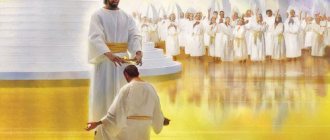Orthodoxy and sports
“Are you interested in sports? It’s forbidden for an Orthodox Christian, it will lead to a cult of the body,” out of mother’s fears for her 35-year-old son. In reality, is it possible or not for an Orthodox Christian to play sports? We offer the reader discussions on the compatibility of sports with the Orthodox worldview.
Many lay people, as soon as they acquire faith, begin to view sports as a non-spiritual activity. Therefore, physical education is defined as a sin and is cut off. This is one of the reasons why in the temple we notice many hunched over men and women with their bellies protruding forward. Whether this is good or bad is difficult to say. The Lord, the person himself and his confessor know about the movements of the heart. If sports activities tempt a Christian to such an extent that they lead, for example, into vanity, pride and interfere with spiritual life, it is really worth thinking carefully about their extent. For example, a professional athlete can live for a long time in worship of his cups and medals, vanity in his championship, or simply in the relief of his muscles. When in this state a person begins to taste the fruits of the Christian spiritual life, the harmfulness of such an attitude towards sports and the body becomes so obvious that he can leave professional pursuits. To outside observers this will seem strange and illogical, but for the former athlete himself, regular home training will be enough. And believe me, he won’t feel like a failure at all.
Of course, the example given is not a reason to treat professional sports as a satanic activity. Sports work can be a stepping stone to a meeting with God.
Let us consider the application of physical education and sports to the life of an ordinary layman. What is the harm and what is the benefit of playing sports for a modern Orthodox parishioner living a spiritual life? To do this, let us turn to the pastoral practice of the holy fathers. Saint Theophan the Recluse recommended gymnastics for those involved in mental activity. Saint Basil (Preobrazhensky) and Righteous Alexy (Mechev) also advised their spiritual children to train to develop physical strength and combat idleness.
Someone may object: after all, we do not find such advice in the earlier holy fathers. True, but let's look at the life of a modern city dweller. The more civilization developed, the more physical inactivity progressed - weakening of the body due to poor physical activity and a sedentary lifestyle. (See: How much a person’s life is shortened while sitting) Take, for example, Soviet times, when a huge number of people worked in agriculture. They did not need to invent additional physical activity for themselves. These people were strong and healthy. Many of them, having become grandmothers in the present, are surprised how 25-year-old boys and girls can get sick so much. Yes, life in the country was not easy then. Many had to bring cold water and heat the stove in the apartment (!), which is unthinkable for modern people.
So, should we turn off the water now and start fetching it ourselves? This would be a very strange decision. It’s probably better to think about what to do with the physical activity of residents of megacities, including, by the way, our children.
Let's take a look, for example, at the average recommendations for physical activity of the All-Union Scientific Research Institute of Physical Culture. So, the average norms of physical education (hours per week):
Do you exercise that much? What about your children?
What can sport give an Orthodox Christian?
A Christian, as you know, always asks himself the question: why do I need this? External actions must provide some benefit in order to do this. So why should a Christian engage in physical education and sports?
First of all, let's consider the physical “shell”. Sports and physical training mean good health, strengthening of the cardiovascular system and musculoskeletal system. An Orthodox person has many responsibilities. Caring for loved ones, studying or working (sometimes both), working at the parish for the glory of God, volunteering... I think everyone will agree that Orthodox Christians live a richer life than secular people. Let's say that for many people it is a feat to get up on Sunday at the same hour as on weekdays. A believer, to the best of his ability, tries to manage affairs “conscientiously”; this requires considerable labor costs. A physically unprepared Christian may sometimes simply not have the strength to follow the prayer rule. In a word, a modern Orthodox person needs to do everything in time and with the highest quality possible. Physical training can help with this.
Sports and exercise are excellent antidepressants. The question often comes to mind: why weren’t there so many people in need of psychological help before? Back in the middle of the 20th century, people had to do a lot of physical labor. For example, my grandmother, living in a rented apartment in a provincial town in the 60s, had to bring water, chop wood, light the stove, and also had to do laundry and cook. From the age of 3 months, the child was sent to a nursery, went to work and came running to feed him “by the hour.”
People then transferred the experience of overcoming physical difficulties to the psychological plane, receiving natural antidepressants: “I coped with it, I was able to do it. I have no strength, I fell asleep.” I believe that one of the reasons for the worsening psychological problems among modern people is the lack of normal physical activity.
Then there is a very fine line between the psychological and the spiritual.
Who else but athletes knows that if you think about how they will look at you, nothing will work out? Every time they practice, they experience how important attitude is. No matter how much you fall, it is important to get up and move forward, do this work, and not give up. People involved in sports, even amateur ones, know how important it is to move when it seems that there is no strength left. Step forward and here it is “second wind”. Sports people are well aware of when you physically seem to be doing what you usually do, but the result is zero. They know what “here and now” means, what it means to detach from getting a result and enjoy the process. Athletes know well how difficult it is to get back into shape after a break from training. They are well aware that sports results are achieved only through work, sweat, pain, and tears. Isn't it true that these are valuable illustrations of spiritual laws?
It is important that the experience of physical activity can provide invaluable assistance in spiritual life. For example, to encourage one to pray when there seems to be no strength. Do not disturb the rhythm of spiritual life, because it will be bitter to feel the waste and work to replenish it. Try to take care of today and not get too far ahead.
Separately, it should be said that sport improves a person’s appearance. Is it really that important? It turns out yes. And Christians too. From a psychological point of view, appearance is a nonverbal (wordless) way of communication. What do we, Orthodox Christians, want to say to the secular world with our appearance? That Orthodoxy is a faith that makes everyone stooped and ugly? Or that we are the image of God, beautiful temples of the Holy Spirit? Unfortunately, often our loved ones only notice the stoop and protruding belly. Sometimes this also turns them away from the faith, just like attempts to force them into church.
We decorate temple buildings. How wonderful it would be to decorate the temple of our soul with cleanliness, health, even posture, physical strength, modest but beautiful clothes and other decorum. And here again physical education and sports come to the rescue. But even in this case, a caveat is needed. Concern for external things, as we know, should not occupy all the thoughts of an Orthodox Christian, nor interfere with his ordinary affairs and especially his spiritual life. It is useful to listen to your conscience and feel the line when healthy care of the body turns into pleasing the flesh.
What sports can an Orthodox Christian do?
First of all, it is necessary to cut off spiritually dangerous types of physical activity that are closely intertwined with occult practices, such as yoga, Tibetan gymnastics, etc. It is advisable to think about whether the sport is safe for life and not too risky.
Children need something exciting - a scooter, a bicycle, skates, rollers. If parents, for example, roller skate with their children, that’s just wonderful. There is physical activity, spending time together, the possibility of an educational process based on personal example, and many other positive aspects.
In each case, the choice of sport will be individual. In fearing the harm that a particular sport can bring to the spiritual life of a particular person, one must also deeply understand what passions his soul is inclined to. For example, those prone to vanity and anger are probably better off not choosing team-competitive sports (football, basketball, volleyball, etc.). Teenagers, on the contrary, sometimes find these games useful in order to learn how to work in a team, share the victory among everyone, and overcome psychological barriers.
In short, the choice of the type and level of physical activity for each Orthodox Christian is individual and depends on many factors, including spiritual life. There is not and cannot be an unambiguous solution for everyone. The choice must be made with reasoning, which, according to the words of St. John Climacus, “in the novices there is true knowledge of their spiritual structure... In the middle ones it is a feeling that infallibly distinguishes the truly good from the natural and from what is contrary to the good... In the perfect, reasoning is found in them spiritual intelligence, bestowed by Divine enlightenment, which with its lamp can enlighten what is dark in the souls of others.” Using the reasoning and advice of our confessor, we will stop tormenting priests on forums with questions “can Orthodox Christians play sports” and will take a new step towards spiritual maturity and responsibility for our lives.
Author: Ekaterina Solovyova
Please note that the information presented on the site is for informational and educational purposes only and is not intended for self-diagnosis and self-medication. The selection and prescription of medications, treatment methods, as well as monitoring their use can only be carried out by the attending physician. Be sure to consult a specialist.
“An Orthodox priest talked to an athlete from a Muslim family”
Figure skater Kamila Valieva, who has suffered in recent days, spoke with the confessor of the Russian Olympic team, Andrei Alekseev.
This conversation, which took place before the decision of the Court of Arbitration for Sport, sparked a debate on social networks. In particular, Damir Mukhetdinov, First Deputy Chairman of the Spiritual Administration of Muslims of the Russian Federation, spoke on this topic.
“From the fact that an Orthodox priest spoke with an athlete from a Muslim family, Kamila Valieva, during difficult days for her, we understood that, firstly, there is an Orthodox priest next to our athletes in the Olympic village, and, secondly, from any There are no other religions (despite the fact that there are four traditional religions in Russia) near our athletes at the Olympics,” writes Mukhetdinov.
“The Olympic Games were originally part of ancient pagan religiosity”
“Here, probably, one could argue a lot that religious support for the Olympic team should be provided by representatives of all the main traditional faiths of Russia. There were regimental mullahs in the Russian Imperial Army,” says Kazan publicist Mark Shishkin. “But if you look deeper, the topic of “big sport and religion” in general can lead to a complete revision of existing institutions, taking at least those topics that lie on the surface.”
Photo: Ramil Gali
According to him, the Olympic Games were originally part of ancient pagan religiosity. Their abolition coincided with the establishment of Christianity in the ancient world, and their revival chronologically coincides with the beginning of the de-Christianization of Western civilization.
“Muslims, I believe, have many of their own complaints about this phenomenon. In particular, to the dress code of participants and participants. Should representatives of Abrahamic religions play on this field, or is it better to stand in solidarity with the growing number of critics of the Olympic movement? These are questions that are much more significant than the fact that a Russian priest talked to a Tatar girl. And the answer to these questions should be very balanced,” summarizes Shishkin.
Photo on poster: fsrussia.ru
“She can always turn to anyone for support, we cannot reproach her”
“Doesn’t she have the right to talk to whomever she wants? — asks the adviser to the Mufti of the Republic of Tatarstan on social issues, imam-khatyb of the Yardem mosque Ildar Bayazitov. — In our country there is freedom of religion, everyone has the right to adhere to one religion or another or not to adhere to it at all. If this is Camila's choice, and if the conversation was fatherly in nature and had a beneficial effect on her, I don't see anything wrong with it. She is a young girl, so much has fallen on her, she needs support. She can always turn to anyone for support, we cannot reproach her.”
Photo: Salavat Kamaletdinov
Russia is a multi-religious country, and if domestic athletes want spiritual representatives of other religions to be present at the Olympic Games, this issue can be brought up for discussion, for example, at the level of the Public Chamber, Bayazitov believes.









